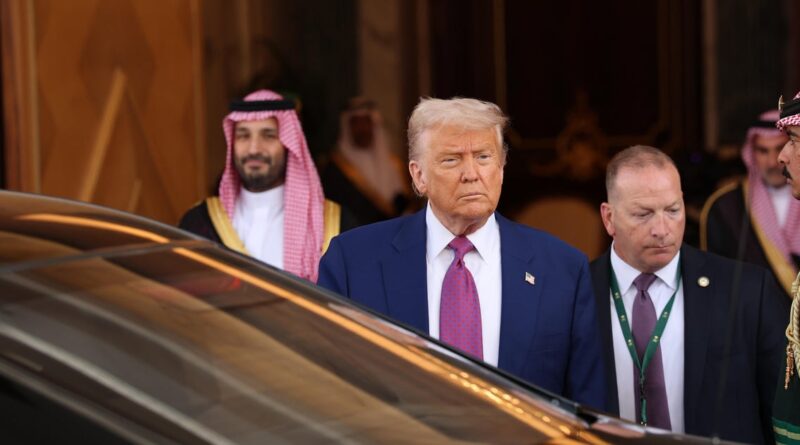Trump says he will lift Syria sanctions: “I say good luck, Syria. Show us something special.”
President Trump will cut off sanctions on Syria, he announced Tuesday, pushing to normalize relations with the country after the ouster of its long-standing dictator Bashar al-Assad.
“I will be ordering the cessation of sanctions against Syria in order to give them a chance at greatness,” Mr. Trump said in a speech in Saudi Arabia. “The sanctions were brutal and crippling, and served … an important function, nevertheless, at the time, but now it’s their time to shine.”
“I say good luck, Syria. Show us something very special,” the president said.
Mr. Trump is also expected to greet new Syrian President Ahmed al-Sharaa in Saudi Arabia on Wednesday, according to the White House, and Secretary of State Marco Rubio is planning to meet with the Syrian foreign minister in Turkey later this week, Mr. Trump announced Tuesday. Mr. Trump will be the first U.S. president to meet with a Syrian leader since Bill Clinton met with Assad’s father Hafez al-Assad.
A former insurgent, Sharaa ascended to power last year as Bashar al-Assad’s government rapidly crumbled in the span of several days — bringing an abrupt end to a more than decadelong civil war that devastated Syria. Sharaa previously led Hayat Tahrir al-Sham, or HTS, an Islamist rebel group that fought the Assad regime and has its roots in the al-Qaeda-allied Nusra Front. Sharaa also participated in the insurgency against U.S. forces in Iraq in the 2000s.
Until last year, the U.S. had a $10 million bounty on Sharaa due to his leadership of HTS, which is designated by the U.S. as a foreign terrorist organization.
Despite the collapse of Assad’s government, many of the intense U.S. sanctions placed on Syria during the last 13 years of Assad’s reign — which were marked by civil war and severe human rights abuses — have remained in place. The Trump administration has been left to decide whether to normalize relations with a government in Syria that could hold back Iranian influence — even if its leader has his roots in extremist movements.
The sudden detente between the U.S. and Syria, which have not had normal diplomatic relations in over a decade, was backed by Saudi Crown Prince Mohammed bin Salman and Turkish President Recep Tayyip Erdogan, Mr. Trump said. Saudi Arabia has begun building a relationship with Sharaa’s government, a move that could be aimed at limiting the influence of Saudi Arabia’s archrival Iran, which aided Assad in his fight against Sharaa and other rebels for years.
Meanwhile, key U.S. ally Israel has been more wary of Sharaa, and has continued airstrikes against Syrian targets — angering Sharaa’s government.
Republican Sen. Lindsey Graham expressed the need to exercise caution and go through the proper congressional channels in order to ease sanctions on Syria. Graham arrived in Turkey on Tuesday to meet with U.S. and Turkish officials about the situation in Syria.
“I am very inclined to support sanctions relief for Syria under the right conditions,” Graham said in a statement. “However, we must remember that the current leadership in Syria achieved its position through force of arms, not through the will of its people. I know the Trump administration has provided guidance to Syrian officials about conditions that need to be met before any sanctions can be relieved.”
Graham said he is “certain that Congress would need to be informed of changes in conditions placed on Syria and how they have met those conditions before Congress can make an informed decision on whether or not it should approve the change in designation.” He also said Israeli officials are “extremely concerned” about the “state of play in Syria.”
“Waiving congressionally passed sanctions is a complicated process,” Graham said. “While I would like to empower the new players in Syria, it has to be done in a coordinated fashion with our allies — especially our friends in Israel — so that numerous security concerns can be addressed.”
Mr. Trump was in Saudi Arabia on Tuesday for the first stop of his four-day trip to the Middle East. The trip is Mr. Trump’s first of his second term and later this week, he will travel to Qatar and the United Arab Emirates.
The president delivered remarks at a U.S.-Saudi investment summit in Riyadh, Saudi Arabia’s capital, as the White House announced a $600 billion investment from Saudi Arabia, including what it touted as the “largest defense sales agreement in history.”

